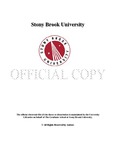| dc.identifier.uri | http://hdl.handle.net/1951/55568 | |
| dc.identifier.uri | http://hdl.handle.net/11401/70888 | |
| dc.description.sponsorship | This work is sponsored by the Stony Brook University Graduate School in compliance with the requirements for completion of degree. | en_US |
| dc.format | Monograph | |
| dc.format.medium | Electronic Resource | en_US |
| dc.language.iso | en_US | |
| dc.publisher | The Graduate School, Stony Brook University: Stony Brook, NY. | |
| dc.type | Dissertation | |
| dcterms.abstract | The conservative movement was one of the few political movements which supported the Vietnam War. This dissertation looks at the reasons why most conservatives supported the Vietnam War and how that affected the Right's political philosophy. The Right's anti-communist and anti-liberal identity explains much of the reasons why it supported the war, but supporting the unpopular war greatly affected the movement's makeup and ideology. Complicating movement cohesion was the presence of a conservative anti-war protest movement.This dissertation's central argument is that the politics of supporting the war helped unravel the movement's various intellectual factions, largely resulting in the separation of conservatives who supported the war from those who did not. The Right's internal debates about the Vietnam War help explain why the American conservative movement underwent a significant ideological transformation in the wake of Barry Goldwater's defeat in the 1964 presidential election. The late 1960s and early 1970s witnessed the rise of the Religious Right and the declining influence of libertarians.By explaining how libertarians dissented against the Vietnam War, and examining the hateful rhetoric by mainstream conservatives toward libertarians, I argue that this helped weaken the connection between libertarians (who supported individual freedom) and the Right. Simultaneously, Christian anti-communists, who were often Christian Evangelicals, strongly endorsed the war. This helped strengthen ties between the Religious Right and conservatism, which developed into a fruitful relationship, forever changing the ideology of the conservative movement | |
| dcterms.available | 2012-05-15T18:05:27Z | |
| dcterms.available | 2015-04-24T14:45:00Z | |
| dcterms.contributor | Barnhart, Michael | en_US |
| dcterms.contributor | Alan Brinkley | en_US |
| dcterms.contributor | Themis Chronopoulos | en_US |
| dcterms.contributor | Herman Lebovics. | en_US |
| dcterms.creator | Offenbach, Seth | |
| dcterms.dateAccepted | 2012-05-15T18:05:27Z | |
| dcterms.dateAccepted | 2015-04-24T14:45:00Z | |
| dcterms.dateSubmitted | 2012-05-15T18:05:27Z | |
| dcterms.dateSubmitted | 2015-04-24T14:45:00Z | |
| dcterms.description | Department of History | en_US |
| dcterms.format | Monograph | |
| dcterms.format | Application/PDF | en_US |
| dcterms.identifier | http://hdl.handle.net/1951/55568 | |
| dcterms.identifier | Offenbach_grad.sunysb_0771E_10349.pdf | en_US |
| dcterms.identifier | http://hdl.handle.net/11401/70888 | |
| dcterms.issued | 2010-12-01 | |
| dcterms.language | en_US | |
| dcterms.provenance | Made available in DSpace on 2012-05-15T18:05:27Z (GMT). No. of bitstreams: 1
Offenbach_grad.sunysb_0771E_10349.pdf: 1604898 bytes, checksum: 14e2c8b40b315fc92b388cc29da8793c (MD5)
Previous issue date: 1 | en |
| dcterms.provenance | Made available in DSpace on 2015-04-24T14:45:00Z (GMT). No. of bitstreams: 3
Offenbach_grad.sunysb_0771E_10349.pdf.jpg: 3187 bytes, checksum: 17066d4449db985bb006951a280eccb1 (MD5)
Offenbach_grad.sunysb_0771E_10349.pdf.txt: 554757 bytes, checksum: b28054f4f285a5960b5cce457fd6887a (MD5)
Offenbach_grad.sunysb_0771E_10349.pdf: 1604894 bytes, checksum: f526d364d4b3fd289f3ea47920be7f8b (MD5)
Previous issue date: 1 | en |
| dcterms.publisher | The Graduate School, Stony Brook University: Stony Brook, NY. | |
| dcterms.subject | Cold War, conservatism, politics, US History, Vietnam | |
| dcterms.subject | American History | |
| dcterms.title | The Other Side of Vietnam: The Conservative Movement and the Vietnam War | |
| dcterms.type | Dissertation | |

